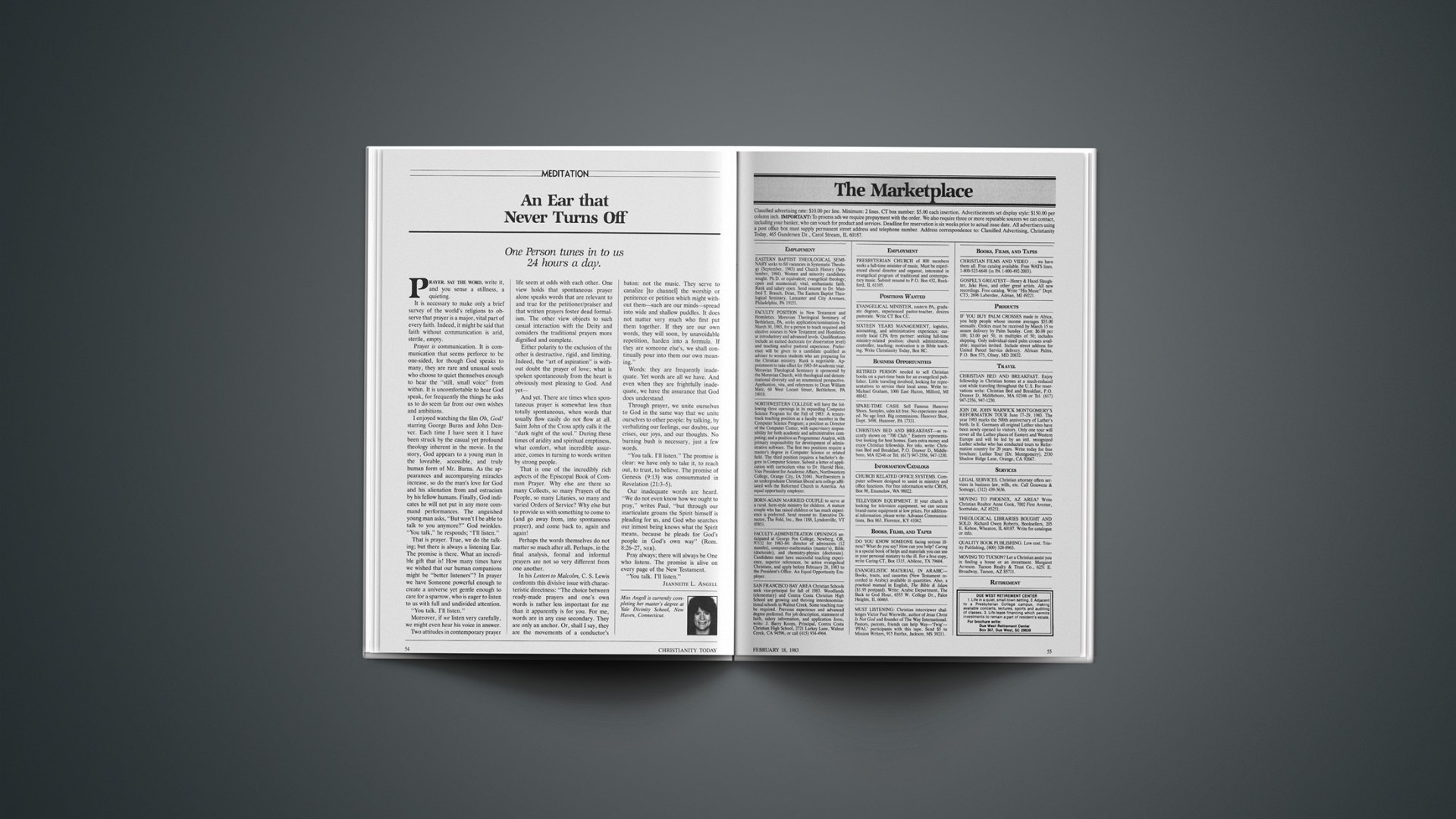One Person tunes in to us 24 hours a day.
Prayer. say the Word, write it, and you sense a stillness, a quieting.
It is necessary to make only a brief survey of the world’s religions to observe that prayer is a major, vital part of every faith. Indeed, it might be said that faith without communication is arid, sterile, empty.
Prayer is communication. It is communication that seems perforce to be one-sided, for though God speaks to many, they are rare and unusual souls who choose to quiet themselves enough to hear the “still, small voice” from within. It is uncomfortable to hear God speak, for frequently the things he asks us to do seem far from our own wishes and ambitions.
I enjoyed watching the film Oh, God! starring George Burns and John Denver. Each time I have seen it I have been struck by the casual yet profound theology inherent in the movie. In the story, God appears to a young man in the loveable, accessible, and truly human form of Mr. Burns. As the appearances and accompanying miracles increase, so do the man’s love for God and his alienation from and ostracism by his fellow humans. Finally, God indicates he will not put in any more command performances. The anguished young man asks, “But won’t I be able to talk to you anymore?” God twinkles. “You talk,” he responds; “I’ll listen.”
That is prayer. True, we do the talking; but there is always a listening Ear. The promise is there. What an incredible gift that is! How many times have we wished that our human companions might be “better listeners”? In prayer we have Someone powerful enough to create a universe yet gentle enough to care for a sparrow, who is eager to listen to us with full and undivided attention.
“You talk. I’ll listen.”
Moreover, if we listen very carefully, we might even hear his voice in answer. Two attitudes in contemporary prayer life seem at odds with each other. One view holds that spontaneous prayer alone speaks words that are relevant to and true for the petitioner/praiser and that written prayers foster dead formalism. The other view objects to such casual interaction with the Deity and considers the traditional prayers more dignified and complete.
Either polarity to the exclusion of the other is destructive, rigid, and limiting. Indeed, the “art of aspiration” is without doubt the prayer of love; what is spoken spontaneously from the heart is obviously most pleasing to God. And yet—
And yet. There are times when spontaneous prayer is somewhat less than totally spontaneous, when words that usually flow easily do not flow at all. Saint John of the Cross aptly calls it the “dark night of the soul.” During these times of aridity and spiritual emptiness, what comfort, what incredible assurance, comes in turning to words written by strong people.
That is one of the incredibly rich aspects of the Episcopal Book of Common Prayer. Why else are there so many Collects, so many Prayers of the People, so many Litanies, so many and varied Orders of Service? Why else but to provide us with something to come to (and go away from, into spontaneous prayer), and come back to, again and again!
Perhaps the words themselves do not matter so much after all. Perhaps, in the final analysis, formal and informal prayers are not so very different from one another.
In his Letters to Malcolm, C. S. Lewis confronts this divisive issue with characteristic directness: “The choice between ready-made prayers and one’s own words is rather less important for me than it apparently is for you. For me, words are in any case secondary. They are only an anchor. Or, shall I say, they are the movements of a conductor’s baton: not the music. They serve to canalize [to channel] the worship or penitence or petition which might without them—such are our minds—spread into wide and shallow puddles. It does not matter very much who first put them together. If they are our own words, they will soon, by unavoidable repetition, harden into a formula. If they are someone else’s, we shall continually pour into them our own meaning.”
Words: they are frequently inadequate. Yet words are all we have. And even when they are frightfully inadequate, we have the assurance that God does understand.
Through prayer, we unite ourselves to God in the same way that we unite ourselves to other people: by talking, by verbalizing our feelings, our doubts, our crises, our joys, and our thoughts. No burning bush is necessary, just a few words.
“You talk. I’ll listen.” The promise is clear: we have only to take it, to reach out, to trust, to believe. The promise of Genesis (9:13) was consummated in Revelation (21:3–5).
Our inadequate words are heard. “We do not even know how we ought to pray,” writes Paul, “but through our inarticulate groans the Spirit himself is pleading for us, and God who searches our inmost being knows what the Spirit means, because he pleads for God’s people in God’s own way” (Rom. 8:26–27, NEB).
Pray always; there will always be One who listens. The promise is alive on every page of the New Testament.
“You talk. I’ll listen.”
JEANNETTE L. ANGELL1Miss Angell is currently completing her master’s degree at Yale Divinity School, New Haven, Connecticut.










